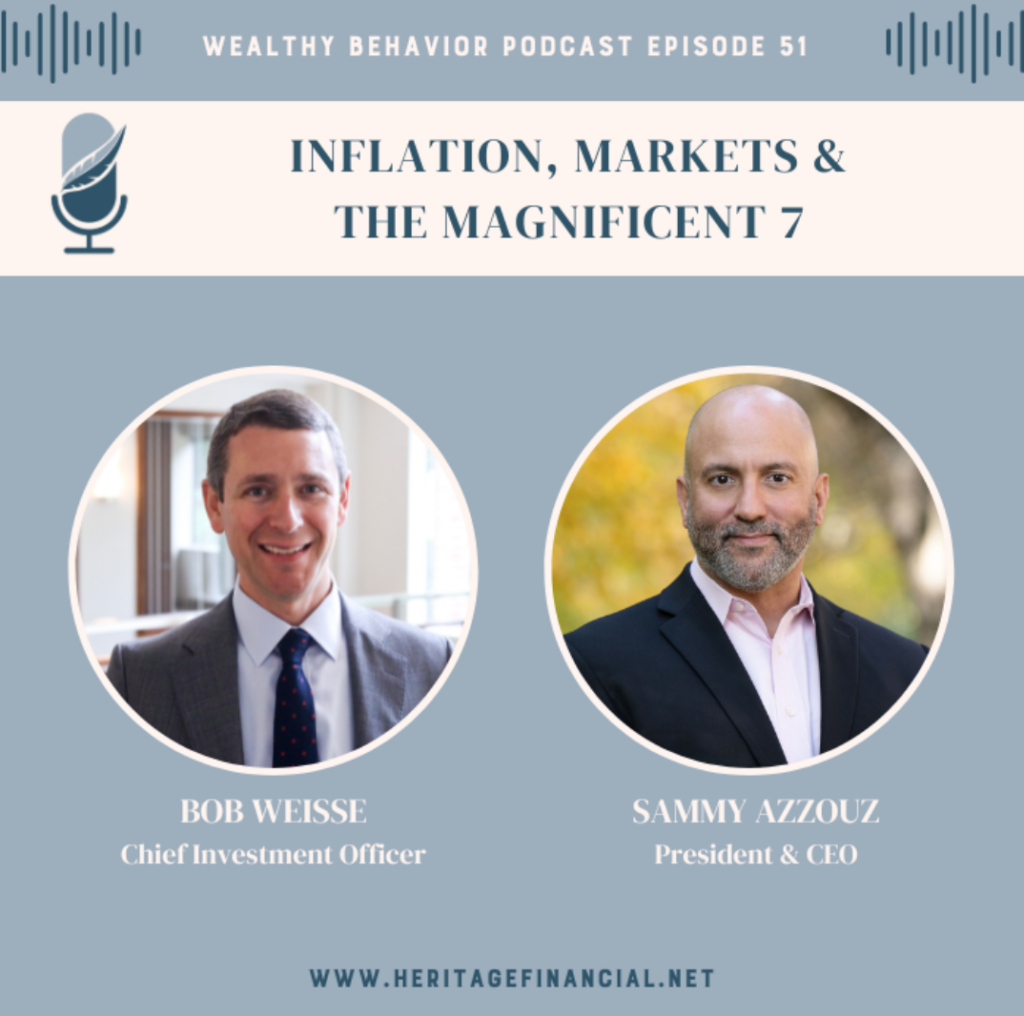Your Money This Week
In Your Money This Week I’m recapping an excellent conversation I had with Heritage’s Chief Investment Officer, Bob Weisse, yesterday in our Wealthy Behavior podcast about the market, what changed with the April inflation reports, and the Magnificent Seven.

Inflation, Markets, and the Magnificent 7
Available through link above and wherever you get your podcasts
Inflation and the Markets
As readers know, April’s CPI report coming in hotter than expected which caused a mild sell-off in stocks and bond yields to continue climbing. Bob believes the April economic reports changed things for the market, which had bought into a Goldilocks narrative that inflation was slayed and an accommodative Fed would be cutting rates early and often. That’s why there was a strong rally in Q4 2023 and earlier this year.
But stubborn inflation, labor market strength, and the Fed’s own statements have changed market expectations dramatically to now maybe only two cuts later this year and hikes being a possibility.
Is this now too pessimistic?
Who knows?
Interest rates and inflation are notoriously difficult to forecast – even the supposed experts get it wrong more than half the time – and narrative-based investing is a mistake.
Focus on your long-term portfolio expectations and not forecasts or stories, be diversified, and stay humble.
And to help yourself understand market moves, even if you’re not going to reach to them, it’s important to remember that with news: It’s not good or bad, it’s better or worse (than expectations).
Housing
We discussed concerns about whether higher costs faced by landlords and elevated mortgage rates will keep shelter costs from improving inflation. Shelter is a lagging data point and there is cause for optimism that it’ll improve from here, but it’s a concern to watch.
Magnificent Seven
For those not up-to-date on your Wall St. lingo, the Magnificent Seven is Microsoft, Apple, Nvidia, Alphabet, Amazon, Meta and Tesla.
Some of these can’t miss stocks have performed very well recently, and we’re getting questions about why investors shouldn’t shift more money into them given how strong they are and will continue to be, which would entail dumping investments that aren’t keeping pace.
One thing to bear in mind with this topic that answers the question without digging into the numbers is understanding the evolution of this can’t miss list.
First, it was the FANG stocks with one A: Facebook, Amazon, Netflix and Google (Alphabet).
Then, it was FAANG with an extra A to add Apple.
Then, it became FAANGM once Microsoft started outperforming.
Now, we’ve added Nvidia and Tesla and dropped Netflix because it plummeted more than 50% since it became a can’t miss stock.
And on the current list, Tesla is getting killed and Apple is down almost 20%, so some can’t miss names are missing.
Bob shared that the N’s are the key to him in puncturing this approach.
Netflix was in the first three versions, and it’s gotten clobbered. Nvidia was just added, so if you were following along you didn’t own it during the best part of its run, and without it the Magnificent Seven aren’t magnificent.
Bob also shared data that once you’re a top ten stock your performance tails off. For various reasons, they don’t keep compounding at the same rate, and studies have shown that five or ten years later these great names underperform the market.
Bottom line: we think you should own them and we do own them for clients, we’re just not jettisoning everything else in our portfolio to chase them.
FOMO isn’t a profitable investment strategy.
Got questions?
I’m always happy to hear from readers and help in anyway I can.
